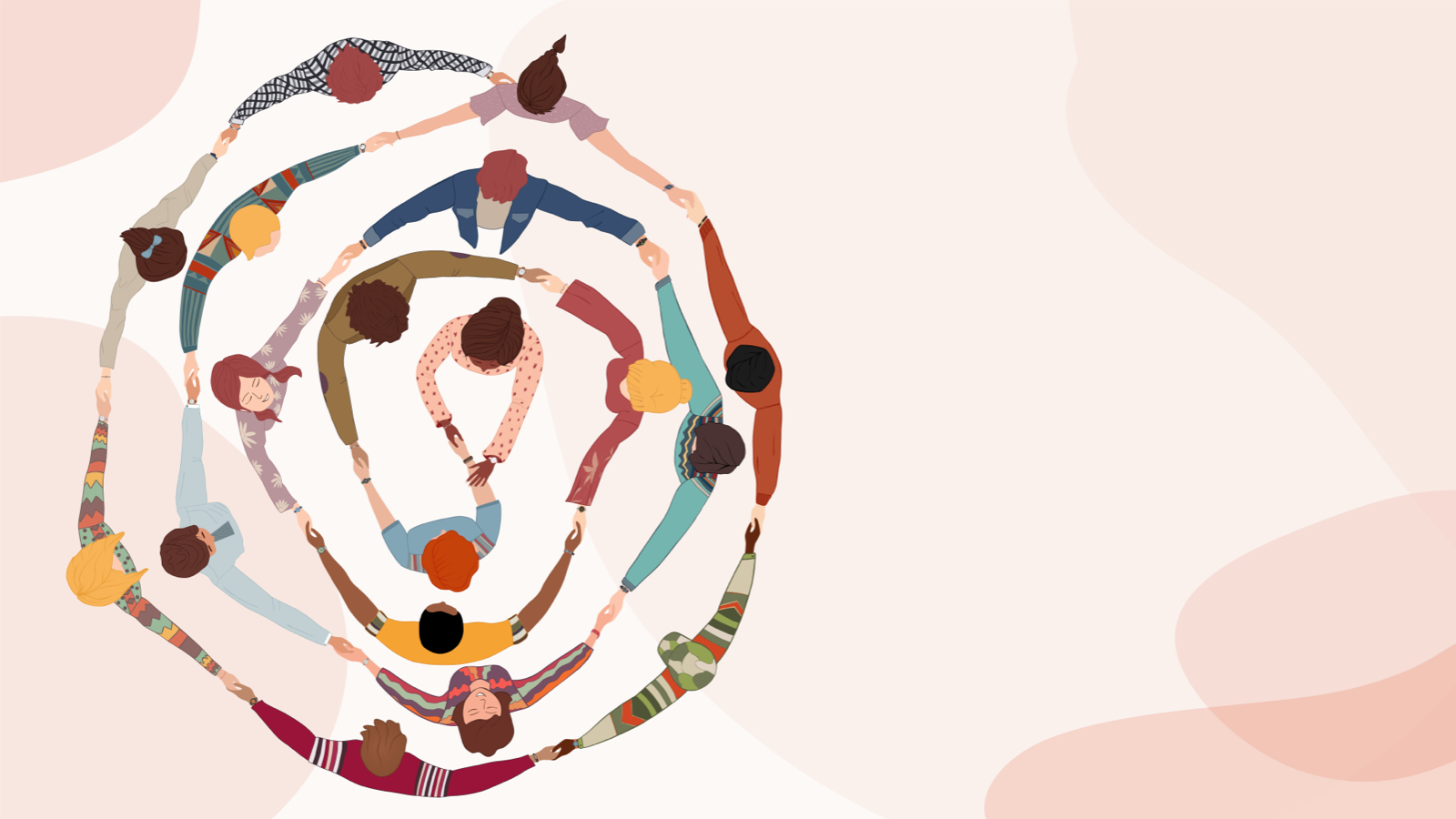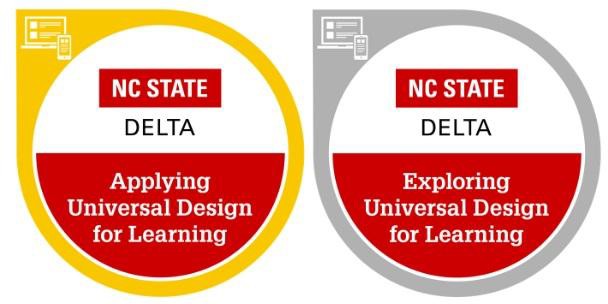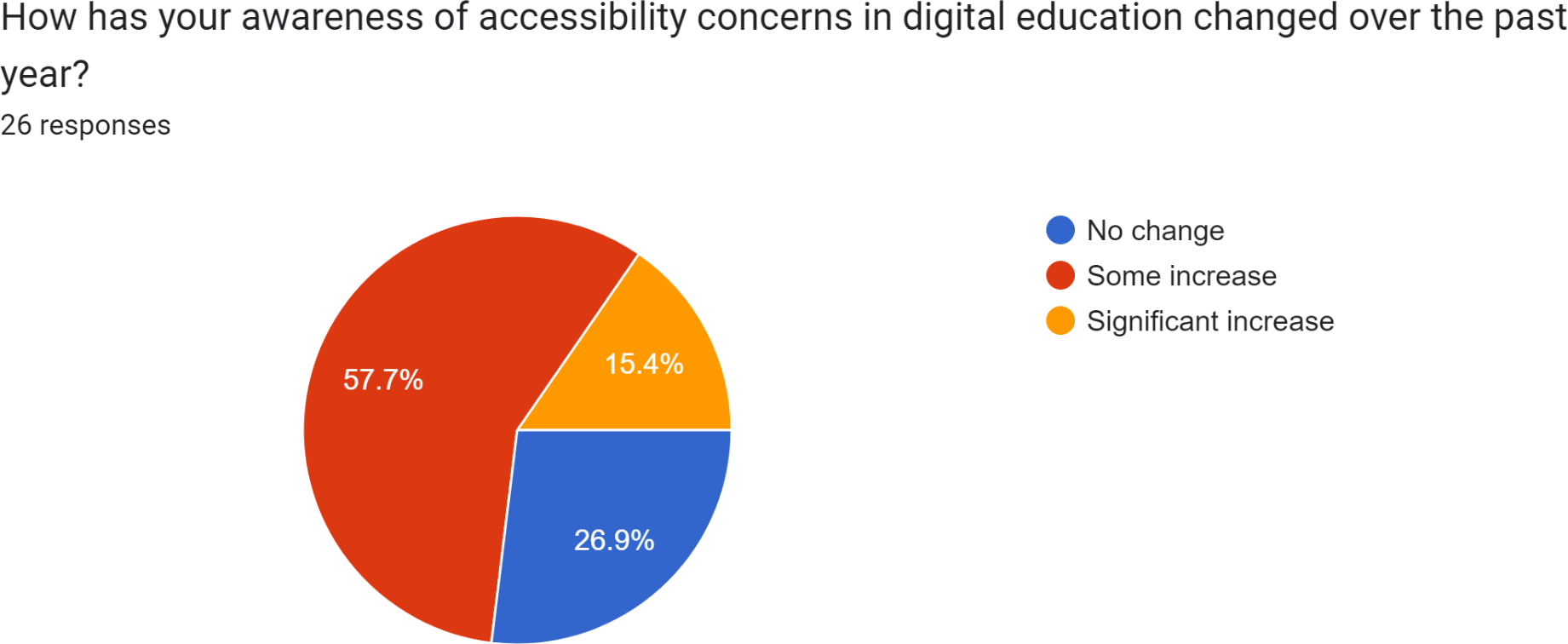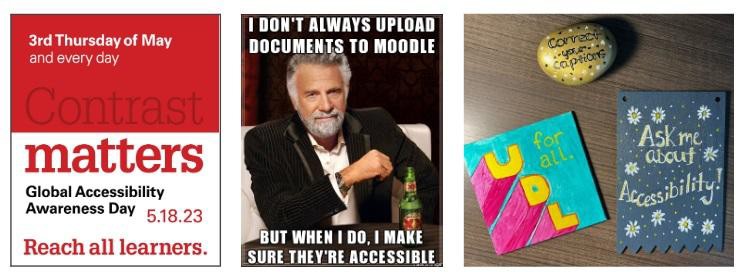Sometimes the most effective path to progress is to capitalize on shared passion among individuals with a variety of skills and roles.

NC State University's Digital Education and Learning Technology Applications (DELTA) division provides academic technologies and digital learning expertise for NC State. In April 2021, four DELTA staff members with varied professional roles and diverse areas of expertise recognized a shared personal and professional commitment to supporting accessibility in digital education. We proposed creating a formal team, believing that if we worked together with the approval of senior management, we could have a significant impact on the digital accessibility landscape in our organization and at NC State as a whole. What we have learned could have applications for work around any complex issue (for example, diversity or sustainability) that threads through the work of an organization. In this article, we share our experience and lessons, in hopes that others who are committed to meaningful and important issues that go beyond their official job description might see our work as an argument for interdisciplinary teams and a model for how diverse skills can be leveraged to do good work.
About DELTA
DELTA's role at NC State is to "foster the integration and support of digital learning in NC State's academic programs" and "support online and distance education programs at the university." On the technical side, DELTA hosts the university's learning management system (LMS), manages enterprise licenses for classroom learning technologies and other services, and maintains a knowledge base. The work and expertise in DELTA are not limited to providing and managing technologies. We promote quality teaching, especially teaching using digital tools, regardless of course format. To that end, we conduct various activities:
- Offer instructional media services, instructional design services, and instructional design workshops
- Develop custom applications
- Provide technology support workshops and training for instructors
- Provide DELTA Grants to instructors who want to implement innovative technological solutions in their courses or otherwise improve them
Other offices, including NC State University Libraries and the Office for Faculty Excellence, also support our instructors through programs and expert consultants. In addition to all of this, DELTA supports the online programs for the university and provides proctored testing services.
To support all our work, DELTA's staff of 120 is quite diverse. Our departments include Finance and Business, Online and Distance Education, Academic Technology, Digital Learning, and Marketing and Communications. DELTA employs instructional designers and technologists, support technicians, graphic designers, video production teams, project managers, communications professionals, research and assessment experts, systems support personnel, web developers, and more. Our Senior Management Team ensures that DELTA's activities support our strategic plan and are aligned with the university's broader missions.
Digital accessibility is a major concern in a lot of DELTA's work as we strive to fulfill our mission to "apply our expertise in technologies and pedagogies to create and nurture innovative, effective, and impactful digital learning experiences for our community of instructors and learners." Our Academic Technology department must ensure the applications they purchase and support function in an accessible way; our Digital Learning team incorporates accessibility into course design, media innovation, and instructor support and training; Marketing and Communications must communicate in an accessible way and spread awareness about accessibility issues; and the Online and Distance Education team's work in testing services and online programs must ensure that their programs and products are accessible to all.
Accessibility Team Formation
Although DELTA historically had a position partially dedicated to accessibility, personnel changes and reorganizations resulted in a situation in which, by 2021, no single person or group in DELTA was responsible for championing accessibility in our work. The general expectation was that all DELTA staff should develop competence in any area of accessibility that was relevant to their work, and we maintained close working relationships with accessibility experts in other campus organizations that we could tap into as needed.
Eventually, through more personnel changes across the university, DELTA became responsible for supporting faculty in the remediation of any distance education course in which a student needed accommodations. This new responsibility was one strong argument for more dedicated expertise in the area. Then, a DELTA-produced course component fell short of necessary accessibility standards and drew a complaint (which was promptly addressed and solved). At that point, those in DELTA who were most attuned to digital accessibility concerns felt that a more intentional and strategic approach was necessary.
Informal conversations soon led to the acceptance of a formal proposal for an interdisciplinary accessibility team within the organization (see an anonymized version of our proposal). This team would provide support, consultation, training, and resources internally for DELTA staff and also for NC State instructors and any other accessibility stakeholders across campus. We saw great potential for our interdisciplinary team to bring cross-department perspectives that would support creative problem-solving, systems thinking, and collaborative solutions. It's important to note that DELTA's accessibility team was neither created nor mandated by management within the organization. No individual on the team was assigned to it or asked to serve, but inclusion of this team's accessibility-focused work in each member's annual work plan has been fully endorsed by our managers.
Since fall 2021, our team has comprised four members: an instructional designer, an instructional technologist, a multimedia development expert, and a web developer. True to the spirit of interdisciplinarity, our team's expertise includes instructional design, design and development, pedagogy, coding, and technical expertise.
Accessibility Team Goals and Successes
Our stated goal as DELTA's accessibility team is to champion and support accessible digital education on three fronts:
- We aim to provide excellent, comprehensive professional development and support for instructors on any relevant aspects of digital accessibility.
- We want to deepen accessibility awareness and expertise across DELTA to better prepare staff to use an accessibility lens in their work.
- We hope to elevate DELTA's presence in the accessibility landscape, ensuring our organization is a leader in digital accessibility and universal design for learning (UDL) at NC State and beyond.
Goal 1: Provide professional development and support for instructors.
To meet this goal, we identified multiple opportunities to cultivate awareness of accessibility issues and incorporate accessibility principles into the support DELTA offers instructors.
1a: Elevate accessibility issues in our existing programs.
Our team felt DELTA could incorporate accessibility more prominently into the existing workshops, programs, resources, and support we already offer instructors.
- We worked with the Instructional Technology Training team to begin regularly highlighting accessibility aspects within their workshops. For example, our current "bootcamp" sessions for new instructors learning Moodle (our LMS) now use common accessibility language and incorporate threads of usability and accessibility throughout.
- We also advocated for giving UDL and accessibility a more prominent place in the Quality Matters–based course-improvement and instructor-development program we offer each year. Both of these examples are low-cost, easy add-ons to work we already do with instructors.
- To further disseminate best practices across the university and raise awareness of digital accessibility issues, we asked for space to include an Accessibility Tip for each monthly DELTA Newsletter, which is sent to all instructors on campus. Each month, we highlight one small topic or tip and provide resources to learn more about that issue. Examples include "PowerPoint Slide Titles," "Video Auto-Captions in Yellowdig," "Color Contrast Tools," and "Course Design for Neurodiverse Learners." We also took advantage of our DELTA Newsletter to share information about "Alternatives to Alt Text" and "Closed Captioning: Not Just a Tool, a Legal Requirement."
- Last, we honed the process for how DELTA efficiently handles accessibility-related questions that our help desk receives. Our help desk already has an efficient ticketing system for questions they receive, so we simply had to develop a workflow that provided clear communication between the help desk and our team. We ended up using a combination of Slack, our internal messaging system, and ServiceNow, our ticketing system.
1b: Launch new accessibility initiatives.
Whereas adding to existing programs required relatively little effort, we also saw potential for creating some new initiatives but needed to be selective and mindful of our resources and time.
- We decided that an Accessibility Express Grant for instructors who wanted to improve the accessibility of a course would give us space to encourage instructors to think proactively about accessibility and would fit into an established structure of mini-grants DELTA offers. Our Express Grants come with a monetary stipend, several consultations with our team throughout a term, and additional DELTA support as needed to help recipients accomplish their goals. For one grant in fall 2023, we created accessible and aesthetically pleasing Moodle templates for an instructor who wanted to move away from using PDFs. For another, we developed, tested, and delivered a workflow to improve the accessibility of her lecture slides.
- We also decided to develop some new workshops. DELTA's Instructional Technology Training team already develops new workshops on a regular basis, so we simply asked that workshops on accessibility be prioritized. In the end, we developed four new workshops on UDL and began offering two UDL badging levels (see figure 1). Instructors who attend all four workshops earn an "Exploring UDL" badge, and those who also complete a take-home assignment for each workshop can earn an "Applying UDL" badge. We also developed a comprehensive digital accessibility workshop. Some resources that came out of these efforts include Teaching Resources articles and videos such as "Increase Equity, Access and Engagement with Universal Design for Learning," "Boost Motivation with Universal Design for Learning," "Elevate Your Content with Universal Design for Learning," and "Optimize Student Performance with Universal Design for Learning." We also developed an Online Course Accessibility Checklist and a Digital Accessibility Guide for instructors and course designers.
Figure 1. Digital Badges for Applying UDL (left) and Exploring UDL (right) 
- Another new initiative was providing consultation and support for a new accessibility tool. Soon after our team formed, DELTA needed to make a decision about whether to purchase an enterprise license for an LMS-based accessibility checker. Evaluating new tools is something that DELTA staff do regularly, and our team was recruited to test this program. The tool was purchased, and after its adoption, the lead instructional technologist on our team led the development of workshops, video tutorials, and a user guide for this tool and contributed to related DELTA Knowledge Base articles. New resources related to this tool include a Brickfield Accessibility+ Toolkit YouTube Playlist and Brickfield Accessibility+ Toolkit: User Guide.
Goal 2: Deepen accessibility awareness and expertise across DELTA.
In fall 2022, we conducted a very informal survey of DELTA staff (see figure 2) to determine how much awareness and expertise staff members felt they had and to learn their thoughts about growing their expertise. Discovering a diversity of interests, we took several approaches to work toward this goal.

2a: Raise accessibility awareness across DELTA.
A very basic goal was to help DELTA staff become more aware of accessibility issues they encounter in their daily work. We have used the annual Global Accessibility Awareness Day (GAAD)—for which we spread activities over a full week—as an avenue for bringing up accessibility and making it something that, at least for that week, DELTA cannot possibly forget about! In 2022 and 2023, we developed events including Slack-channel trivia games, accessibility crafting parties, donut drops in our offices, and accessibility meme contests. We also requested stickers from one of our DELTA graphic designers to pass out during that week. Examples of the stickers, a meme from the Slack meme contest, and accessibility crafts are shown in figure 3. All these efforts were undertaken in the hope of not only helping DELTA staff remember the importance of accessibility but also helping them remember that our team exists and is available to them as a resource.

2b: Increase levels of expertise across DELTA.
- DELTA staff expressed interest in internal sessions or workshops. At times, we integrated these activities into existing meetings with our respective teams. Our survey indicated that long workshops were a less-preferred option for our staff, but we did, for instance, give a 10-minute presentation on alternative text as a part of a biweekly meeting. In addition, when one team requested a more thorough web accessibility workshop, we opened up participation to the full staff and had solid attendance numbers.
- We also use an open Slack channel to post informative tidbits that we come across and to create a space where any channel member can crowdsource an answer to an accessibility question they may have. Currently, there are 47 members of the #accessibility Slack channel.
2c: Grow our own team's expertise.
In support of our team's mission, we have been able to set aside time to grow our own expertise within the team.
- As we review accessibility grant applications, we consider whether working on the proposed project is an opportunity to deepen our own knowledge or take on a new challenge. In fall 2023, a mathematics instructor who wanted to make her course accessible for a blind student applied. This was an area in which we felt we lacked expertise. By working with the instructor, we are much more able to provide future support in this area.
- In the realm of more formal professional development, team members have participated in CAST's Universal Design for Learning in Higher Education course and have earned EDUCAUSE's Digital Accessibility Program Planning microcredential.
Goal 3: Elevate DELTA's presence on the accessibility landscape.
Part of our mission statement is to create "impactful digital learning experiences" at NC State. For digital learning experiences to be impactful, they must be accessible, and thus we feel that accessibility is a core component to accomplishing our mission. We hope that DELTA can be seen on NC State's campus and beyond as a key partner in accessibility and a leader in this area. Our efforts on this front include the following:
3a: Increase our NC State visibility and involvement.
We recognize that other organizations, units, and individuals (such as University Libraries, the Office of Information Technology, the Disability Resources Office, and the Office of Institutional Equity and Diversity) have important roles to play in accessibility at NC State, and we've ramped up our efforts to network and connect with them in meaningful ways.
- We meet regularly with NC State's IT accessibility coordinator and with staff members from University Libraries to share what we're working on generally or to discuss specific topics (for example, making data visualizations accessible or helping a blind student learn LaTeX). We've worked more closely with the accessibility coordinator to support faculty who have enrolled students with registered disabilities.
- We've presented on digital accessibility at a conference for instructors co-hosted by the NC State Office for Faculty Excellence, University Libraries, and DELTA.
In the past year, we've been contacted to present on UDL by a university-wide DEI collaborative and to provide a core workshop for individuals pursuing a certificate from the Office of Institutional Equity and Diversity. We view these requests—which we gladly accepted—as indications that we are elevating DELTA's place on the accessibility landscape.
3b: Increase our team's external visibility, involvement, and connections.
Knowing that accessibility is an issue across higher education, we hope to also network and share with peers at other institutions.
- We've participated more consistently in the North Carolina Higher Education Digital Accessibility Collaborative (NCHEDAC) and the Universal Design in Learning in Higher Education (UDLHE) Network.
- We've presented about our team's work at several conferences, including UNC Cause (2022), the UNC System Learning and Technology Symposium (2023), and the EDUCAUSE Learning Initiative Annual Meeting (2023), where our presentation was a featured session.
- Members of our team have also presented at Global Accessibility Awareness Day conferences (2022).
- Recently, we connected with a former colleague who is now working for a global tech company to invite him to present to an NC State audience about accessible data visualization.
Reflections and Lessons Learned
Lesson 1: With support from leadership, we can accomplish things outside our prescribed job duties.
Feeling unable to address issues outside one's prescribed job duties is not uncommon, nor is lacking the time and space to add an additional suite of tasks to one's role. We were very gratified to find that, by effectively aligning our passion for accessibility with DELTA's overall mission, we garnered the support of DELTA leadership. This enabled us to chart a path forward and dedicate time to something that was not explicitly part of our job descriptions. We feel empowered by the success of this grassroots effort, and we also appreciate the support and guidance of senior management, who meet with us quarterly to provide feedback on our work and consult on future efforts. We emphasize the importance of drawing deep connections between one's passion and the organizational mission, of regular communication with leadership, and of establishing mutual expectations.
Lesson 2: Interdisciplinarity has been key to our success.
Our team is an interdisciplinary one more by chance than design—it was serendipitous that the staff members interested in creating the team came from different backgrounds. Yet this has proven to be a huge strength for us. We've been able to disseminate accessibility awareness and consideration more broadly by having team members spread across DELTA rather than siloed in one group. Our skills and expertise are complementary, and we find that each of us is able to take leadership on initiatives that align most closely with our greatest areas of knowledge while also building on our deeper understanding of issues by working alongside colleagues with different focuses. For example, when helping a faculty member convert stylized PDFs into LMS pages, one team member used his HTML coding experience, while others weighed in on the aesthetics of design. We encourage anyone creating working groups or teams to intentionally consider interdisciplinarity.
Lesson 3: Mind the scope and effort, and maximize scalability.
The flexibility we've enjoyed in augmenting our existing roles with more accessibility-related work has sometimes made managing scope more difficult. It's easy to bite off more than we anticipated in pursuit of making improvements, and what starts as a small task can quickly balloon. This has required us to frequently consider how our efforts scale in impact and whether we can contribute incrementally by making many small changes that add up. Some examples include creating guides or workflows for remediation that can then be shared broadly, choosing tools that can be deployed across the university, or creating presentation resources that can be repurposed and repacked more easily for different audiences. Going forward, we will focus even more strongly on creating reusable resources, building a library of tools and tips that we can share easily.
Conclusion
Ours is a hopeful and positive story. With the support of senior management and the clear, agreed-upon value of our work, our accessibility team has been a largely successful endeavor. We believe that we have met little resistance not only because of the culture or our organization but also because we weren't asking for considerable resources at the team's inception—we did not try to create a new position within DELTA or ask for any job changes or reorganization. We pitched our idea as a distributed effort.
We hope that those who have a passion for an area of important work that falls outside their defined job duties will feel inspired to find others—especially those who work in different roles—and figure out ways to pool their talents and time to make genuine strides toward common goals. And we hope that our story has some lessons that are valuable in those efforts.
Jill Anderson is Lead Instructional Technologist at North Carolina State University.
Jonathan Champ is Associate Director – Data, Integrations and Custom Applications at North Carolina State University.
Caitlin McKeown is Lead Instructional Designer at North Carolina State University.
David Tredwell is Team Lead, Multimedia Development at North Carolina State University.
© 2024 Jill Anderson, Jonathan Champ, Caitlin McKeown, and David Tredwell.
